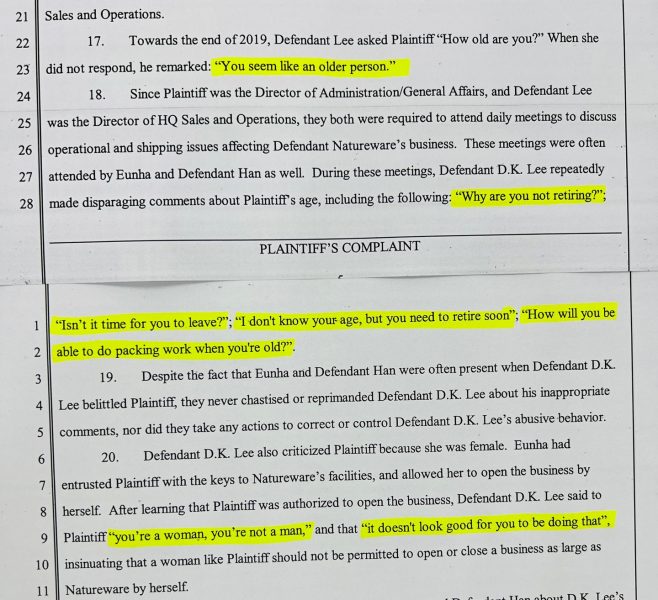[The Korea Daily-USC: Healing California Project]
A Korean-American woman who was fired after hearing blatant ageism from coworkers and demanding improvements from her company has won a two-year legal battle.
Soon-Yi Park (pseudonym, 60) recently won a court ruling for wrongful termination compensation. In June, the company she worked for admitted fault for her illegal termination and paid her a settlement.
In June 2022, Park filed a lawsuit in Orange County Superior Court alleging that Cypress-based Korean-American distributor of dietary supplements fired her for age discrimination.

In her complaint, Park alleged that the company and her employer, Shin, made ageist comments to her during meetings, such as “You look old,” “Why don’t you retire,” and “Isn’t it time for you to leave?” but failed to take appropriate action.
Furthermore, her coworker, Lee, said that Park, the head of the general affairs, used blatantly ageist words such as “younger people are better,” “employers don’t like old people,” and “don’t hire old people” during the employee recruitment process, implicitly insulting Park and interfering with her work. Park asked Shin and others to take remedial action, but instead, Shin fired her, the complaint states.
According to the federal Equal Employment Opportunity Commission (EEOC), the government’s Age Discrimination in Employment Act (AEDA) of 1967 prohibits employers from discriminating against or firing employees over the age of 40 in the workplace because of their age. This includes making fun of or humiliating an employee because they are older.
However, some Korean-American companies have been found to tolerate or condone age discrimination in the workplace, often citing Korea’s “retirement age culture” as a reason for pressuring older employees.
Park, who sued her employer, was recognized for her abilities as a general affairs manager, but was eventually discriminated against and pushed out because of her age.
“Most companies don’t directly mention age when pressuring older employees,” said an attorney Chanho Joo, “but some Korean-American companies continue to make age-related comments, such as ‘your work performance is poor or you work too slowly.'”
Cultural customs contribute to the problem
The cultural practice of “ageism” in Korean-American companies is most common among branches or subsidiaries with headquarters in Korea.
According to labor law experts, Korea’s retirement age law is often the cause. Some branches following instructions from the headquarters in South Korea, often fire employees based on their age, even if it means risking a lawsuit. In South Korea, the law allows employees to work until the age of 60, after which most must retire.
“It’s very common for Korean headquarters to ignore U.S. age discrimination laws,” said Joo, ”and then get caught up in lawsuits filed by former employees claiming labor law violations.
According to labor lawyers, workplace cultures that violate federal labor laws are particularly common in Korean-American companies, including rigid hierarchical relationships based on position, a seniority culture that has no legal basis, and negative perceptions of older people.
Conflicts between Korean-American employees who emphasize their age are also common. English-speaking employees who grew up in the U.S. recognize and treat their coworkers as equals, but those who are familiar with Korean culture often clash when they do not use formal language for elders or force salutations.
Importance of a horizontal work culture
Korean-American lawyers agreed that it is important to comply with labor laws, including age discrimination laws, and to establish a horizontal workplace culture.
“Many employers are not aware that they cannot discriminate against or dismiss employees over the age of 40 because of their age,” said Attorney Haewon Kim. ”Employers should not dismiss employees because of their age, pregnancy, disability, race, or religion. Employees who file a wrongful termination lawsuit can claim that the company’s actions were illegal and against public policy and can also claim punitive damages.”
Age discrimination also raises red flags for mental health. “When an employee is fired for age discrimination, it takes a huge toll on their lives, including financial hardship,” said Susan Chung, a psychiatrist. “They are especially traumatized because they feel that the company or society doesn’t need their (older) presence. For Korean-American men, work is often an identity that proves who they are. This can lead to depression, including lethargy, insomnia, low self-esteem, and even deterioration in physical health.”
According to a study by the Department of Sociology at Chung-Ang University in Korea, “Age Discrimination and Suicidal Ideation Among Korean Older Adults,” seniors who experienced age discrimination were 2.3 times more likely to have suicidal thoughts.

Actively working in 80s without age discrimination
On the other hand, the American culture of not restricting or discriminating against age has led to a growing number of Korean American seniors working well into their 70s and 80s. They emphasize that continuing to work helps them to realize themselves and take care of their health.
Young Seok Suh, 82, an anesthesiologist who served as Chairman of the Peaceful Unification Advisory Council LA, is still an active doctor. St. Vincent Eye Surgery Center in Koreatown, where he has worked for 15 years, has no intention of letting him go.
“I’m proud to know that I’m still needed somewhere at this age,” Suh said, ”and I’m grateful that the hospital staff recognizes my abilities even though I’m past retirement age. I will continue to work until my hands start to shake.”
Susan Chung (79), a psychiatrist, also runs a mental health YouTube channel and gives consultations and lectures. “When I was younger, I worked to make money and survive, but now I’m happy to do what I really want to do,” she said.
Some seniors retire around the age of 65 and challenge new careers. Security guards and Uber drivers are especially popular among Korean-American male retirees. They said that even with generous pensions, it’s hard to live without work. For some, working is a way to cope with depression.
David Ahn, 71, has been working for three years as a security guard at an office building in Koreatown. “I spent 10 years not working after retirement, but the daily routine without having to work was just unbearable,” he said. ”I wanted to challenge myself with something new, so I took the security guard test. There are many places looking for senior security guards. If you are bored with your daily routine, I recommend that you try something new.”
BY HYOUNGJAE KIM, HOONSIK WOO [kim.ian@koreadaily.com]


![Deeper-I, Efinix sign deal to develop world’s first AI-FPGA single-chip solution Ikuo Nakanishi, left, vice president of sales at Efinix and Lee Sanghun, right, CEO of Deep-I pose for a photo after signing MOU on March 26. [Provided by Deeper-I]](https://www.koreadailyus.com/wp-content/uploads/2025/04/0401-DeeperI-100x70.png)

